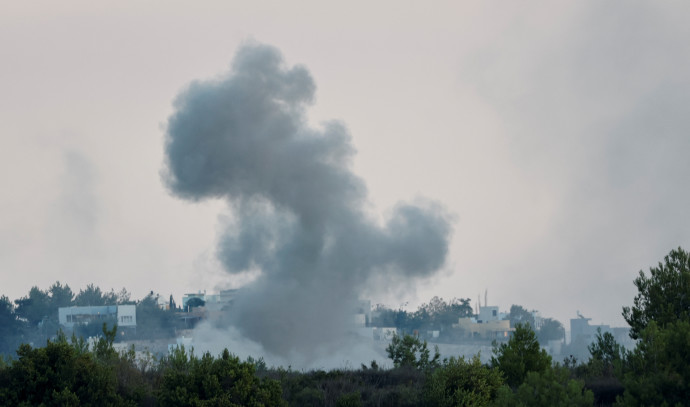An article published by the BBC on Saturday can shed some light on the town of Alma al-Shaab – sometimes spelled “Aalma El Chaeb” – located across the border from the Israeli community of Hanita, which has been a frequent target of Hezbollah attacks.
Alma al-Shaab is a Christian village and shares a similar name with Ayta ash-Shaab, a different town located 17 km. to the east, which is a frequent target of IDF strikes due to Hezbollah’s presence. The article is titled “Why 800 people fled a sun-kissed Mediterranean village,” and is written by Ali Abbas Ahmadi. “Why, why us?” asks Milad Eid, a resident of the village. “An hour earlier, he was dousing a fire at a house that had been hit by an Israeli missile. While he was there, a bomb struck another one,” reads the article.It sketches out a story of a town whose residents had to flee due to the conflict between Hezbollah and Israel. Since October 8, Hezbollah has launched thousands of rockets, missiles, and drones at Israel in support of Hamas after the attacks on October 7. This has plunged the poor people of the border villages of Lebanon into a war zone.
These are people who have no say in the fact Hezbollah uses their lands to hide weapons. Hezbollah has a massive arsenal of 150,000 rockets, it has missiles and drones and effectively functions as an army – an army large enough and similar enough to that of other established states.
Yet these groups have brought destruction to Gaza and Lebanon. IDF Spokesman R.-Adm. Daniel Hagari warned on Sunday, “Hezbollah’s increasing aggression is bringing us to the brink of what could be a wider escalation – one that could have devastating consequences for Lebanon and the entire region… Israel must defend the people of Israel. We will fulfill that duty – at all costs.”
Israel will face an uphill struggle in Lebanon
Israel, however, will face an uphill battle in Lebanon, not only because of Hezbollah but also because of global media coverage and the international community, which will oppose Israel launching any kind of larger war in the North. Meaning, that it is acceptable for Hezbollah to launch 4,000 rockets at Israel in eight months and force the evacuation of thousands from their homes, but not to go to war over it.
According to the BBC report, around 800 people fled this small Christian town. “Nobody knows why they are attacking our houses,” Eid says. “It’s not our war.” Eid is correct; it is not his war. Hezbollah has hijacked this landscape; its actions in southern Lebanon have harmed Christian villages like Eid’s, as well as many others belonging to various groups, such as Shi’ites, who live in southern Lebanon. And yet any Israeli action in this area is likely to come in for global critique because the cards are stacked against Jerusalem. The BBC article, for instance, notes that the village’s “closeness to the border has seen it heavily targeted by Israeli forces over the past nine months.” The reason why it was targeted is absent. This approach mirrors the one used towards Hamas’s presence in Gaza. Hamas’s presence in hospitals, schools, and tunnels under civilian homes is rarely critiqued or discussed the way it needs to be on the international stage.Hezbollah and Hamas both exploit the civilian landscape, though southern Lebanon is different than Gaza because it is less urban and the towns are more spread out. The BBC report says that by May 2024 the village had been “hit 188 times,” according to the Beirut Urban Lab, a research center. There is no context or reason given for these hits either. The IDF says it targets Hezbollah fighters and infrastructure and retaliates to attacks on army bases in the North. Still, some top Lebanese officials accused it of “implementing scorched earth tactics to make the whole area uninhabitable,” the article says. This is how these stories are reported: There are the Israeli claims, followed by the claims of the anti-Israel voices, with no due diligence to find out which is closer to the truth. The fact that Hezbollah has used these areas to attack is precisely why they are targeted.The BBC report nearly gets at the truth. “The villagers the BBC spoke to were reluctant to discuss whether Hezbollah or other armed groups were using Alma al-Shaab to attack Israel. One hinted that locals had unsuccessfully tried to stop fighters from using their land.” The article says that 10 houses have been destroyed in the village – does this mean that Hezbollah sought to enter this Christian village and use it as cover? This would be an extreme violation of the rights of these people.
Where is the UN? Where are the other observers? This report is symbolic in that it almost gets at the truth but refuses to fully uncover how Hezbollah has destroyed the lives of villages like this one. The illegal terrorist group has harmed these beautiful areas by using them in the war on Israel, a fact that the international community conveniently ignores. It doesn’t send observers or investigate the claims and counter-claims. Instead, what we end up with is claims that Israel is targeting civilian homes, with no deeper investigation as to why, or into Hezbollah’s presence. Did it enter this area when civilians left, exploiting it? Or did it already use the village? Why is Hezbollah using this Christian village, if it is, and to what extent is it doing so? We will likely never know the answers, because if and when a war comes, these areas will continue to be targeted. In the end, all the civilian homes that are damaged will go into one large list, without any reference to whether the homes were used by Hezbollah. This is how terrorist groups operate; they make sure that they exploit the civilian landscape to benefit from it. This is the uphill battle Israel faces.







